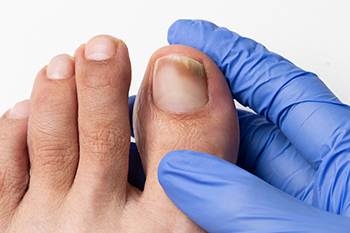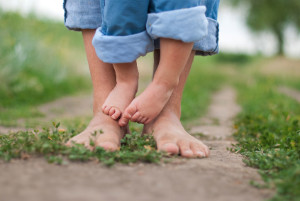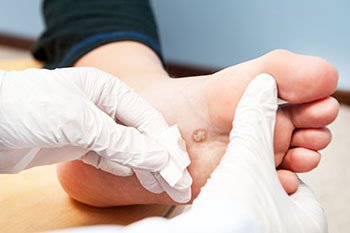

There are various ailments that can affect the toenails, and toenail fungus is considered to be the most common. Research has indicated that approximately 10 percent of adults suffer from this type of infection, and it can affect both feet. Common symptoms include yellowed toenails that can become brittle and may ultimately fall off. Toenail fungus is known to be challenging to treat, and often requires medical attention. The fungus that causes this unsightly condition lives and thrives in warm and moist environments, such as locker rooms, public swimming pools, and shower room floors. It can enter the body through small cuts in the feet of which the patient may be unaware of. Toenail fungus may easily be avoided when specific prevention methods are consistently followed. Wearing socks that are made of breathable materials, trimming the toenails correctly, and avoiding sharing shoes and socks may help in eliminating toenail fungus. Additionally, it is extremely beneficial to wear appropriate shoes while in these areas, which often includes flip flops or water shoes. If you are affected by toenail fungus, please consult a podiatrist who can effectively treat this condition.
If left untreated, toenail fungus may spread to other toenails, skin, or even fingernails. If you suspect you have toenail fungus it is important to seek treatment right away. For more information about treatment, contact Dr. Stephan J. LaPointe of Georgia Foot & Ankle Specialists . Our doctor can provide the care you need to keep you pain-free and on your feet.
Symptoms
Treatment
If self-care strategies and over-the-counter medications does not help your fungus, your podiatrist may give you a prescription drug instead. Even if you find relief from your toenail fungus symptoms, you may experience a repeat infection in the future.
Prevention
In order to prevent getting toenail fungus in the future, you should always make sure to wash your feet with soap and water. After washing, it is important to dry your feet thoroughly especially in between the toes. When trimming your toenails, be sure to trim straight across instead of in a rounded shape. It is crucial not to cover up discolored nails with nail polish because that will prevent your nail from being able to “breathe”.
In some cases, surgical procedure may be needed to remove the toenail fungus. Consult with your podiatrist about the best treatment options for your case of toenail fungus.
If you have any questions, please feel free to contact our office located in Rome, GA . We offer the newest diagnostic and treatment technologies for all your foot care needs.

Shoes are worn for foot protection and it is not necessary to have your children or babies wear them while indoors. However, they are urged to wear them when walking outside. The feet can become stronger because the toes can grip the floor when they are indoors, and this will aid in balancing. Outside terrain can be full of sharp objects and the feet can easily get hurt if they are not well protected. Your child’s first milestones can consist of walking and crawling, and these are often reached while indoors. These can be easier to accomplish when shoes are not worn, giving the feet more ability to move freely. If you would like additional information about the benefits of walking inside without shoes, please ask a podiatrist who can answer any questions you may have.
Making sure that your children maintain good foot health is very important as they grow. If you have any questions, contact Dr. Stephan J. LaPointe of Georgia Foot & Ankle Specialists . Our doctor can provide the care you need to keep you pain-free and on your feet.
Keeping Children's Feet Healthy
Having healthy feet during childhood can help prevent medical problems later in life, namely in the back and legs. As children grow, their feet require different types of care. Here are some things to consider...
Although babies do not walk yet, it is still very important to take care of their feet.
Avoid putting tight shoes or socks on his or her feet.
Allow the baby to stretch and kick his or her feet to feel comfortable.
As a toddler, kids are now on the move and begin to develop differently. At this age, toddlers are getting a feel for walking, so don’t be alarmed if your toddler is unsteady or ‘walks funny’.
As your child gets older, it is important to teach them how to take care of their feet.
Show them proper hygiene to prevent infections such as fungus.
Be watchful for any pain or injury.
Have all injuries checked by a doctor as soon as possible.
Comfortable, protective shoes should always be worn, especially at play.
If you have any questions please feel free to contact our office located in Rome, GA . We offer the newest diagnostic and treatment technologies for all your foot and ankle needs.

Plantar fasciitis is one of the most common sources of heel pain. It is caused by inflammation of the plantar fascia, the band of tissue that runs along the bottom of the foot, from the heel bone to the toes. The plantar fascia plays an important role in supporting the arch of the foot and absorbs shock from walking. Plantar fasciitis can feel like a deep, stabbing pain at the front part of the heel and is often worse after arising from sleep, standing on hard surfaces, or sitting for long periods. Things that may cause plantar fasciitis include participating in activities that stretch or tear the tissue, being overweight, or having an abnormal gait. Wearing ill-fitting shoes, especially those that cramp the toes or with poor support, including high heels, is also problematic. The biggest risk factor for this condition is advanced age because of the wear and tear from a lifetime of foot use. This can be debilitating to this age group and interfere greatly with mobility and quality of life. If you are a senior and suffer from plantar fasciitis, it is important to obtain treatment from a podiatrist before the pain becomes chronic.
Plantar fasciitis can be very painful and inconvenient. If you are experiencing heel pain or symptoms of plantar fasciitis, contact Dr. Stephan J. LaPointe from Georgia Foot & Ankle Specialists . Our doctor can provide the care you need to keep you pain-free and on your feet.
What Is Plantar Fasciitis?
Plantar fasciitis is the inflammation of the thick band of tissue that runs along the bottom of your foot, known as the plantar fascia, and causes mild to severe heel pain.
What Causes Plantar Fasciitis?
How Can It Be Treated?
While very treatable, plantar fasciitis is definitely not something that should be ignored. Especially in severe cases, speaking to your doctor right away is highly recommended to avoid complications and severe heel pain. Your podiatrist can work with you to provide the appropriate treatment options tailored to your condition.
If you have any questions please feel free to contact our office located in Rome, GA . We offer the newest diagnostic and treatment technologies for all your foot and ankle needs.

The increasingly popular sport of pickleball was born from a cross between tennis, badminton and ping-pong. 2022 marked the 57th anniversary of this sport. It has grown in participation because it is fun and older participants especially think it is easier on the body. However, those who play this sport are still at risk for injury to various parts of their bodies. The quick side-to-side movements in pickleball put the ankle joint at high risk for sprain injuries. The repeated pounding of the feet on hard courts can also lead to foot pain. Investing in good, stable court shoes with a large toe box can help offset some of the pain suffered. Also, increasing the strength of the foot and ankle by practicing balancing exercises on one foot at a time can help in the prevention of injuries. If you are a pickleball player and have sustained an injury or suffer from foot pain, contact a podiatrist who can help with proper diagnoses and treatments appropriate for you.
Sports related foot and ankle injuries require proper treatment before players can go back to their regular routines. For more information, contact Dr. Stephan J. LaPointe of Georgia Foot & Ankle Specialists . Our doctor can provide the care you need to keep you pain-free and on your feet.
Sports Related Foot and Ankle Injuries
Foot and ankle injuries are a common occurrence when it comes to athletes of any sport. While many athletes dismiss the initial aches and pains, the truth is that ignoring potential foot and ankle injuries can lead to serious problems. As athletes continue to place pressure and strain the area further, a mild injury can turn into something as serious as a rupture and may lead to a permanent disability. There are many factors that contribute to sports related foot and ankle injuries, which include failure to warm up properly, not providing support or wearing bad footwear. Common injuries and conditions athletes face, including:
Sports related injuries are commonly treated using the RICE method. This includes rest, applying ice to the injured area, compression and elevating the ankle. More serious sprains and injuries may require surgery, which could include arthroscopic and reconstructive surgery. Rehabilitation and therapy may also be required in order to get any recovering athlete to become fully functional again. Any unusual aches and pains an athlete sustains must be evaluated by a licensed, reputable medical professional.
If you have any questions please feel free to contact our office located in Rome, GA . We offer the newest diagnostic and treatment technologies for all your foot and ankle needs.